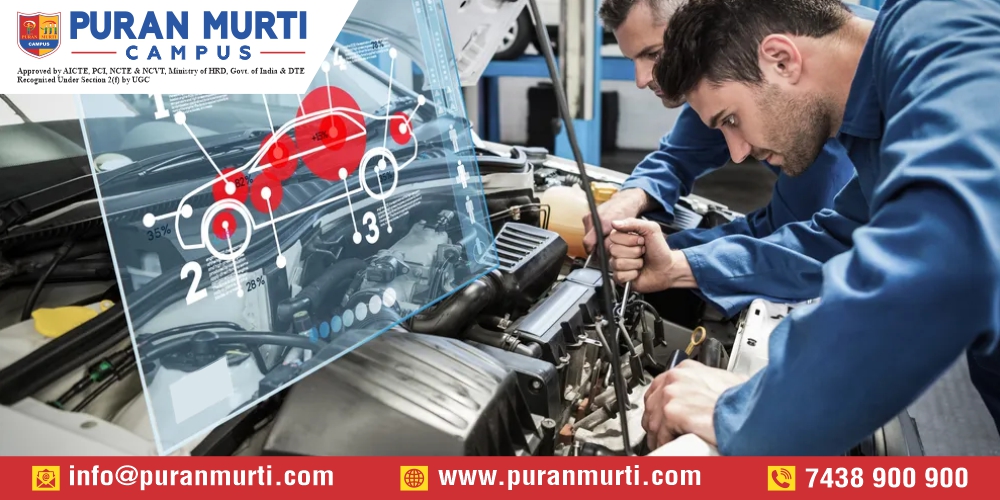Engineered Excellence: Diploma Programs in Automobile Technology
Posted on : 25 June, 2024 6:29 pm
Introduction
- Automobile technology diplomas are pivotal for aspiring automotive professionals, offering a robust foundation in mechanics, electronics, and design. These programs equip students with practical skills essential for diagnosing, repairing, and maintaining vehicles. They emphasize hands-on learning in simulated workshops, ensuring graduates are well-prepared for industry demands. The curriculum integrates theoretical knowledge with real-world applications, fostering critical thinking and problem-solving abilities. Automobile technology diplomas thus play a crucial role in bridging the gap between classroom learning and the dynamic automotive sector, setting the stage for a rewarding career in this ever-evolving industry.
Curriculum Insights
- The curriculum of automobile technology diplomas delves into core subjects like automotive engines, chassis systems, and electrical components. It emphasizes practical training through workshops and labs, complementing theoretical learning. Students gain expertise in diagnostics, repair techniques, and vehicle maintenance, preparing them for diverse roles in the automotive industry. Specialized modules on emerging technologies and sustainability further enrich their skill set, ensuring relevance in a rapidly evolving field.
Hands-On Learning Experience
- Hands-on learning is integral to the automobile technology diploma, providing students with practical experience in real-world automotive scenarios. Through workshops and labs, students apply theoretical knowledge to diagnose, repair, and maintain vehicles. This experiential learning approach enhances technical proficiency and problem-solving skills. It also fosters confidence in handling automotive tools and equipment, preparing graduates for the challenges of the automotive industry with practical competence.
Career Pathways
- Career pathways for graduates of automobile technology diplomas offer diverse opportunities in the automotive industry. Graduates can pursue roles such as automotive technician, service advisor, parts manager, or quality control inspector in dealerships, repair shops, or manufacturing plants. Additionally, opportunities exist in fields like automotive engineering, sales, and aftermarket services. The comprehensive skills acquired through the program prepare graduates for fulfilling careers in various facets of the automotive sector.
Technological Innovations
- Technological innovations in automobile engineering are revolutionizing the industry. Advanced driver-assistance systems (ADAS), electric and hybrid powertrains, and autonomous vehicle technologies are at the forefront. Innovations in materials science are leading to lighter, stronger vehicle structures, enhancing fuel efficiency and safety. These advancements are not only transforming vehicle performance and sustainability but also shaping the future of transportation.
Industry Demands and Challenges
- The automobile industry faces demands for greener, more efficient vehicles and rapid technological advancements. Challenges include meeting stringent environmental regulations, integrating new technologies, and addressing supply chain disruptions. Skilled professionals are needed to innovate and maintain competitiveness in this dynamic sector, balancing sustainability, cost, and performance in an ever-evolving market.
Faculty Expertise
- Faculty in automobile technology diploma programs bring a wealth of expertise from industry and academia. They possess deep knowledge in vehicle design, engine systems, and emerging automotive technologies. Their practical experience and research insights provide students with a comprehensive understanding, preparing them for real-world challenges in the automobile industry through hands-on training and advanced coursework.
Future Trends
- Future trends in automobile technology include the rise of electric and autonomous vehicles, advancements in AI for smart driving, and increased focus on sustainability. Innovations in battery technology and lightweight materials are also shaping the industry. Staying abreast of these trends is crucial for diploma holders aiming to excel in a rapidly evolving automotive landscape.
Specializations
- Specializations in automobile engineering diplomas include automotive design, vehicle dynamics, powertrain engineering, and automotive electronics. Students can also focus on emerging fields like electric vehicle technology, autonomous driving systems, and sustainable automotive practices. These specializations allow students to tailor their education to match industry needs and personal career aspirations, providing a competitive edge in the job market.
Conclusion
- A diploma in automobile engineering equips students with both theoretical knowledge and practical skills essential for the automotive industry. Through hands-on training, specialized coursework, and exposure to the latest technological advancements, graduates are well-prepared to meet industry demands. The program’s emphasis on innovation and sustainability ensures that students are ready to tackle current and future challenges in automotive engineering. With diverse career opportunities and a strong foundation, diploma holders play a crucial role in driving the evolution of the automotive sector, contributing to its growth and development.

